How To Manage Employee Burnout In Your Agency: Causes and Solutions

May 03, 2024
- Agency Advice
- Daniel Trick

You know when you’re just too tired or stressed out and unable to give your best at work?
That’s burnout.
It’s a big deal for you and your employees.
When people are burned out, they’re not happy, and they’re not productive, which can have a significant impact on work.
Managing burnout is about keeping energy levels up and the stress down.
In this guide, we’ll reveal the strategies you can use to reduce employee burnout and keep everyone at your agency feeling their best.
We’ll cover:
- What burnout is
- The impact of burnout
- What causes burnout
- Strategies to manage and prevent employee burnout
What Is Employee Burnout?
Burnout is when people feel mentally and physically exhausted because of their jobs.
It’s not just when you have a bad day or a busy week. It’s when job stress piles up, and you start to feel like you can’t cope with your work demands.
The World Health Organization uses three dimensions to characterize burnout:
- Feelings of energy depletion or exhaustion
- Increased mental distance from one’s job, or feelings of negativism or cynicism related to one’s job
- Reduced professional efficacy
Burnout is an increasingly common concern for employees and businesses. According to Gallup, 26% of U.S. employees very often or always feel burned out at work:
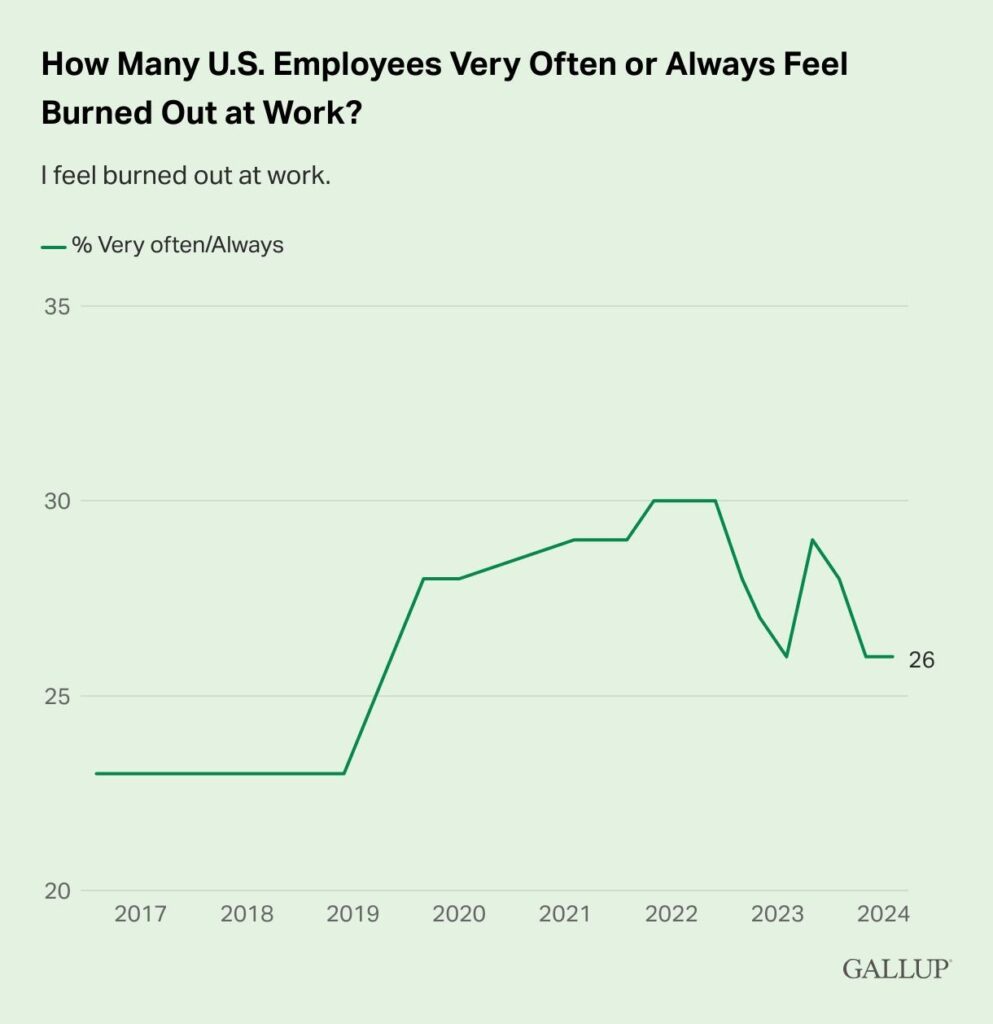
If over a quarter of your team is burnt out, that will significantly impact your agency.
The Impact of Burnout on an Agency
Employees in every profession can experience burnout, but it is more likely to affect marketing agencies than other businesses.
According to a recent Zippia survey, marketing and advertising employees reported more average days of workplace stress per week than any other industry:
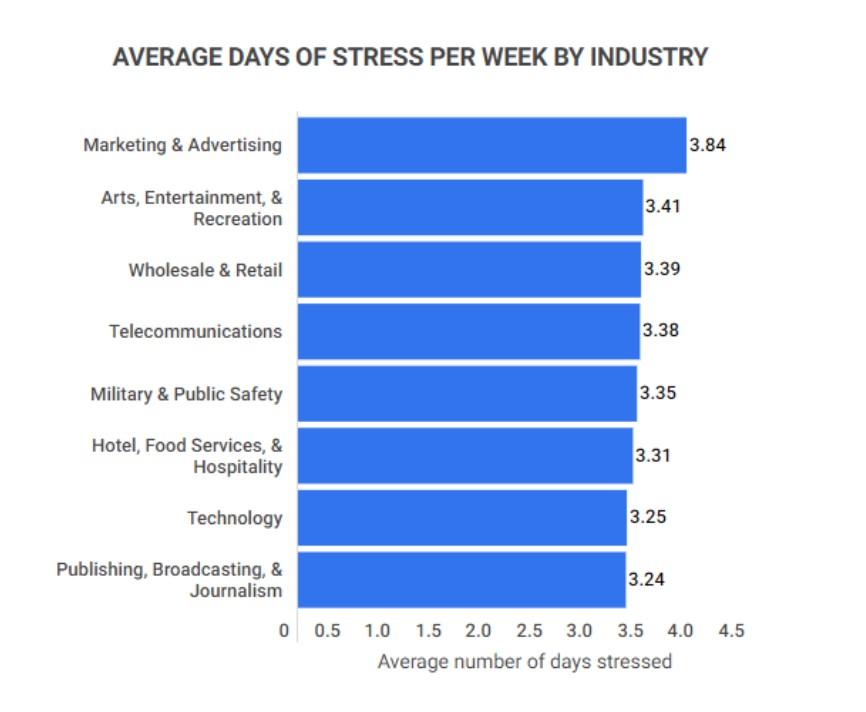
There are three main ways that employee burnout can hit an agency.
First, there’s morale. When team members are burnt out, they’re more likely to be in a bad mood – that’s a natural and understandable reaction.
However, when a few people feel this way, the whole agency can feel less like a team. It can feel like everyone is just trying to make it to the weekend.
Next, productivity can take a big hit. When people are physically and mentally tired, they can’t focus. This means work slows down and often isn’t performed to the usual standard.
A recent LeadershipIQ study found that 54% of managers strongly or moderately agree that they have seen employees be less productive due to burnout:
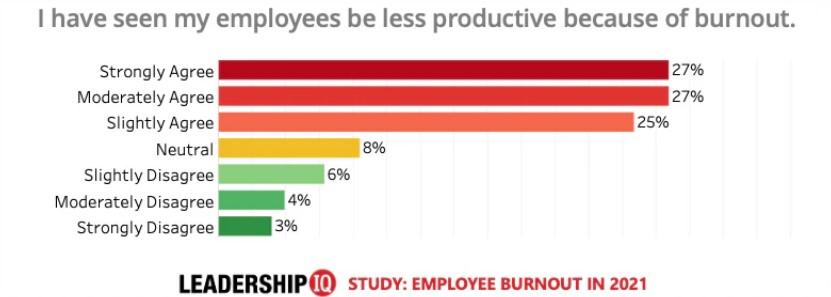
Burnout can also impact employees’ physical and mental health.
You may find that team members call in sick more often. It can also increase employee turnover as some may even start looking for other jobs.
That means your agency loses good people and has to spend time and money finding and training new employees.
Common Causes of Burnout in Agencies
There are a few common causes of employee burnout:
High Workload
It’s common for agencies to experience a high workload.
This can be okay for a while. But if it goes on too long, it can wear people down and lead to burnout.
A recent study by Blind found that unmanageable workload was the most common reason for employee burnout:
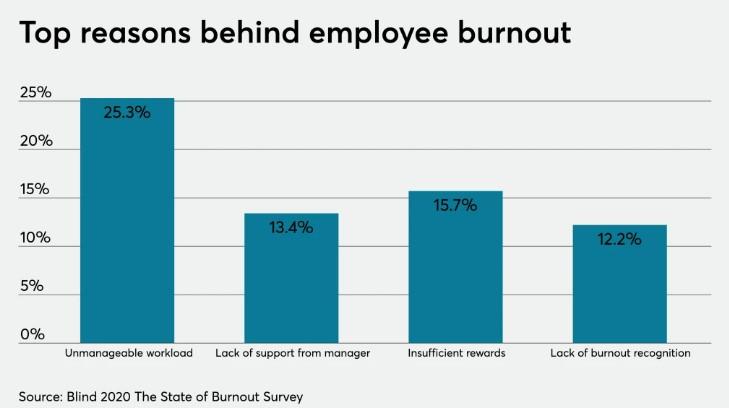
Your team can start to feel like they’re always behind, no matter how many hours they put in.
Setting client expectations early is really important here. Your client onboarding process should involve steps to manage client expectations and be clear about what they can expect from your team.
Lack of Work-Life Balance
Stress builds up when you don’t have enough time to unwind and enjoy life outside of work.
That isn’t good for anyone.
It can make people feel like they’re missing out on time with family and friends or not taking care of themselves. Over time, that can lead to exhaustion.
The best do take days off, they do rest, they do take time to unplug and recharge. To ignore that is to embrace burnout and exhaustion. You can’t be at your best if you are “on” at all times.
Make time for you.
Rest allows us to be at our best.— Kevin DeShazo (@KevinDeShazo) April 16, 2024
Poor Communication
When communication breaks down, it can cause a lot of problems.
Workflows can become disorganized, and team members might not know what they’re supposed to do. This can lead to employee stress, mistakes, or work getting done twice.
Poor communication can also mean that team members don’t feel heard. If they think nobody listens to their ideas or concerns, they will likely feel like their voice doesn’t matter.
Limited Opportunities for Growth and Development
Team members need to see a future at your agency.
You’d get frustrated if you were asked to perform the same tasks every day without learning anything new or having a shot at a promotion.
Everyone likes to have goals to aim for. Without a clear path for team members to achieve their goals, they will likely feel discouraged and burnt out.
Strategies for Addressing Burnout and Creating a Positive Work Environment
An agency environment is fast-paced and demanding. Here’s how you can help your team stay motivated and avoid employee burnout.
Promote Work-Life Balance
The 9-to-5 grind isn’t for everyone. And it doesn’t have to be.
If you can, allow your team to work remotely and set their own schedules. This will give your employees the freedom to work when they’re at their best and most productive.
It’s also important that your team makes the most of their paid vacation time.
In a recent study by Mercer, leadership encouragement to use paid time off was the most used stress management strategy to combat burnout:
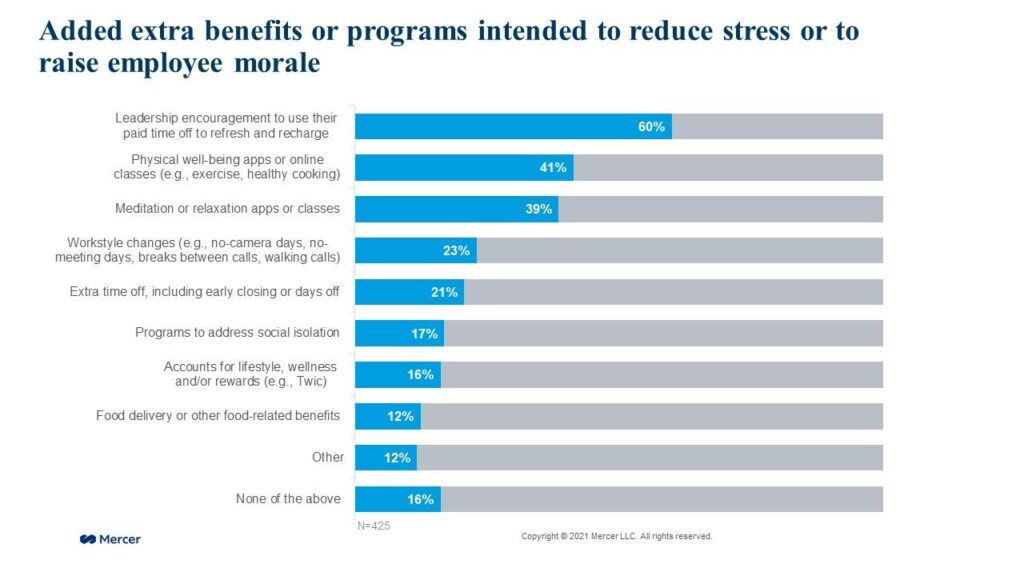
Make it clear that taking vacation time is more than okay – it’s encouraged.
You should keep track of vacation time and encourage employees to schedule time off if they haven’t taken a break in a while.
A healthy work-life balance is good for your employees and your agency. When team members return to work, they’ll be refreshed and ready to go.
Outsourcing
Outsourcing can be an effective way to manage your agency’s workload and reduce the burden on employees.
The key is identifying the tasks that you would benefit most from outsourcing. That requires a clear understanding of your team’s strengths and current needs.
For example, content creation and link building are vital for SEO strategy. But they can be time-consuming.
Outsourcing these tasks can make your agency workflows more effective and efficient.
Your in-house team can focus on strategy and client relationships without being tied up with deliverables. It’s also easy to scale up and down your outsourcing as and when you need to.
Check out our guide on outsourcing SEO for expert tips on how you can get started.
Set Realistic Goals and Expectations
This is about making sure everyone knows what they should be doing and that they have the time to do it well.
That’s why it’s key to make sure everyone understands their job and what’s expected of them. When everyone knows their role, they can focus on doing their job well without worrying about unexpected tasks popping up.
You also want to make sure that the amount of work you take on matches the number of people you have and the hours they can work.
If there’s too much work for your team, you’re going to risk employee burnout.
Offer Opportunities for Skill Development and Advancement
You can boost employee engagement and prevent burnout by providing your team with opportunities to keep learning. That could involve workshops, online courses, or attending industry events to learn new skills.
This will help your team keep their skillsets up-to-date and help you deliver better client results.
It’s also super important for your team to see a future at your agency. Be open about your agency growth plans and what team members need to achieve to advance to higher positions.
When people see they can grow, they’re more likely to stick around and stay motivated.
Encourage Employee Ideas and Feedback
Employees are more engaged and committed to their work when they know their voice matters.
When a team member comes to you with an idea or concern, give them the attention they deserve. Show your team that you value their ideas and contributions.
You’ll also get some valuable insights that can help improve how things are done at your agency.
After suffering career burnout for the past 4-5 years, here’s how I’ve come to understand its cause:
Burnout is a response to repeated attempts to make meaningful change while lacking the agency to do so. See problems > try to fix them > get shot down or ignored.
— Marcy Sutton Todd (@marcysutton) August 10, 2020
It’s also a good idea to set up regular one-on-one meetings with team members where they can talk about any issues they’re facing.
Even if you can’t act on their feedback immediately, discuss their concerns and let them know you appreciate their input.
Prioritize Projects and Deadlines
Some tasks are more important and urgent than others. Deciding which to prioritize is a vital part of SEO project management.
Sit down with your team and determine which projects really need to be done now and which can wait.
That way, everyone knows what to focus on first.
If a deadline can be pushed back without causing problems on the client side, adjust it. Your team will not struggle to get everything done at once and will be able to do a better job on the most important tasks.
Fostering a Happier and More Productive Agency Team
People can’t do their best work when they are burned out. They’re less efficient, make more mistakes, and are more likely to be unsatisfied with their job.
Team members suffering from burnout might even leave. And then you’re stuck trying to replace them.
That’s why you need to take steps to reduce employee stress and avoid burnout before it starts. When your team is happy and healthy, they’ll perform at their best and get better results for your clients.
That’s good for them and good for your agency.
Become a Pro at SEO
Join 65,000 others and learn the secrets to SEO success with our weekly blog posts.

